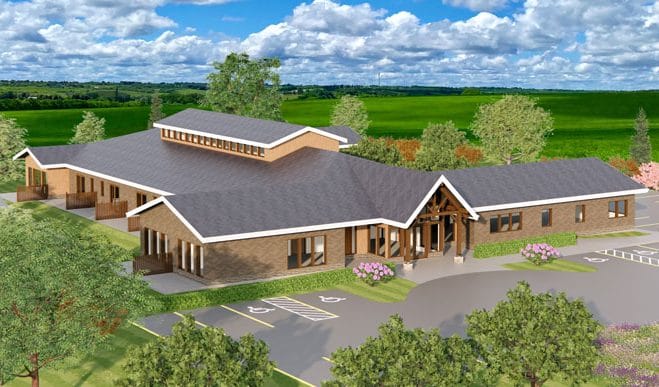ABOYNE – With the donation of land by Wellington County for a hospice facility here, organizers are going full-steam ahead to see the facility built as soon as possible.
And they are organizing a community kick-off event on Sept. 15 at the Wellington County Museum and Archives to introduce the plan to the public, answer questions, and begin to build support for the facility.
“With the donation of land by Wellington County, it helps refocus on efforts to bring a hospice to rural Wellington,” said Dr. Clarissa Burke, a family practitioner in Elora who is part of the organizing committee.
“Volunteers have all come back to the table; new members are coming; we’ve been incorporated; we have charitable status and a building plan. We’re ready to launch a fundraising campaign.”
Dr. Alan Simpson, a retired family doctor who is also part of this hospice movement, found himself working with palliative patients when he opened his practice in Elora in 1973.
Back then, VON (Victoria Order of Nurses) had six palliative nurses who cared for palliative patients in their homes.
“We had a lot of phone discussions. Some patients were mine, some were not mine. As a system, it sort of worked,” Simpson said.
Simpson and Dr. John Stickney, also now retired, worked together to form a palliative care unit at Groves Memorial Community Hospital – the old legacy site – and that kind of worked too, he said.
“We went through medications. Over time we leaned toward symptom control – pain, shortness of breath, end-of-life issues,” he said, adding there was a small room where family could gather and visit their loved one.
With a growing, aging population, the small palliative unit at Groves was not enough. The local medical community could see a separate, dedicated facility was needed.
There is only Hospice Wellington, a 10-bed facility in Guelph, and Hospice Waterloo Region, with 11 beds to serve their rural and urban communities.
Medical assistance in dying (MAID) was not legal until 2016, when the Supreme Court of Canada decided MAID is a human right.
Simpson said that has also added steam to the local initiative.
“Over my time (as a doctor) I can think of 20 or 30 people who we could have done better with end-of-life care,” he said, adding he supports MAID for patients who want it.
“It’s controversial but now it’s a legal option. A lot of folks want that option.”
“Unfortunately MAID took over the conversation about a rural hospice here,” Burke added.
“We are 10 beds behind where we should be and we’ll need 25 beds by 2050.
“MAID is offered in hospitals and in homecare and it will be offered at the new Aboyne Rural Hospice. It is only one (treatment) option however, and it would be unfortunate if MAID became the central focus.”
What is proposed is a 10-bed facility to serve residents of Wellington County. Care will be provided by the local network of doctors and it will be free to patients.
And while the Ministry of Health is heavily involved in approving such a facility, it may contribute toward capital and generally only pays 40 per cent of operating costs.
So even with the donated land, organizers anticipate the cost of constructing a 10-bed facility in Aboyne will run around $10 million and they will also need $2 million to cover operating expenses for the first two years.
And that brings it back to the kick-off event on Sept. 15, from 4:30 to 7:30pm at the museum.
It will be a drop-in format – no need to stay the full three hours if you don’t want to.
There will be kids’ activities, free food, beverages, and volunteers on hand to talk about hospice care in general, and this hospice facility in particular.
“It’s been a long process already and we have been feeling support from the community,” Burke said.
“And we understand there are concerns. But if people could understand the larger concept and why it’s needed, we hope they’ll come around.
“We do know this community cares about its healthcare.”
For more information, visit www.aboyneruralhospice.org.




